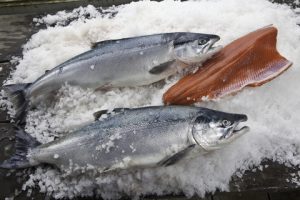Alaska Salmon Season on Copper River Opens May 16
 Sustainably harvested according to strict guidelines set by the state of Alaska, Copper River wild salmon — king, sockeye and coho — are renowned worldwide for good reason. High in protein and naturally rich in heart-healthy omega-3 fatty acids, Copper River salmon return to the region’s massive Delta each year from May to September, making the journey up the steep glacial fed waters. In anticipation of this arduous migration, these salmon naturally build reserves which fuel their journey and make them deliciously rich and desirable to cook.
Sustainably harvested according to strict guidelines set by the state of Alaska, Copper River wild salmon — king, sockeye and coho — are renowned worldwide for good reason. High in protein and naturally rich in heart-healthy omega-3 fatty acids, Copper River salmon return to the region’s massive Delta each year from May to September, making the journey up the steep glacial fed waters. In anticipation of this arduous migration, these salmon naturally build reserves which fuel their journey and make them deliciously rich and desirable to cook.
The small Copper River fleet is made up of independent fishermen who operate small 32-foot boats, carefully catching and bleeding each fish by hand, ensuring the highest quality wild Alaska salmon is sent to retailers in a timely fashion.
The fishery, which has a long legacy of providing superior wild Alaska salmon to restaurants and supermarkets is monitored and managed by biologists at Alaska Department of Fish and Game, using sonar counts, weir passage, aerial escapement surveys, and fishery performance data, to determine escapements and allowable catch. The 2022 commercial harvest forecast for the Copper River District is expected to be below average, so biologists expect a “conservative management approach” at the start of the season.
As the season progresses and more king and sockeye salmon escape up the river to spawn, biologists will adjust commercial openings guided by the state’s regulatory management framework, at the heart of which is the “sustained yield principle.” Overall, this type of management has, as mandated in the Alaska State Constitution since 1959, played a pivotal role in maintaining the fishery while balancing the needs of the environment and fishermen, as well as the marketplace.
“The excitement in town regarding the start of the fishery is palpable right now, always a wonderful time to be on the ground preparing for another season,” said Jeremy Botz, area botanist with the Alaska Department of Fish and Game Gillnet Management. “A tried and true management approach will be used again this year — conservative management measures are planned early in the season based on the below average forecasts, and, as the season progresses, management will be adapted quickly based on in season indices of run strength to balance fishing opportunity and escapement needs. The commercial fishery will be an important means of evaluating the strength of the king and sockeye salmon runs.”
“Here at Copper River/Prince William Sound Marketing Association,” Executive Director Christa Hoover said, “we are excited to see our small boat fishermen preparing for the season ahead. As they harvest these special, wild, nutrient rich fish from our local Alaska waters, we take pride in the fact that our fishery remains sustainable and viable, which considering the global supply issues at hand, is more important than ever.”
For updates on the specialty food industry, subscribe to Gourmet News.






